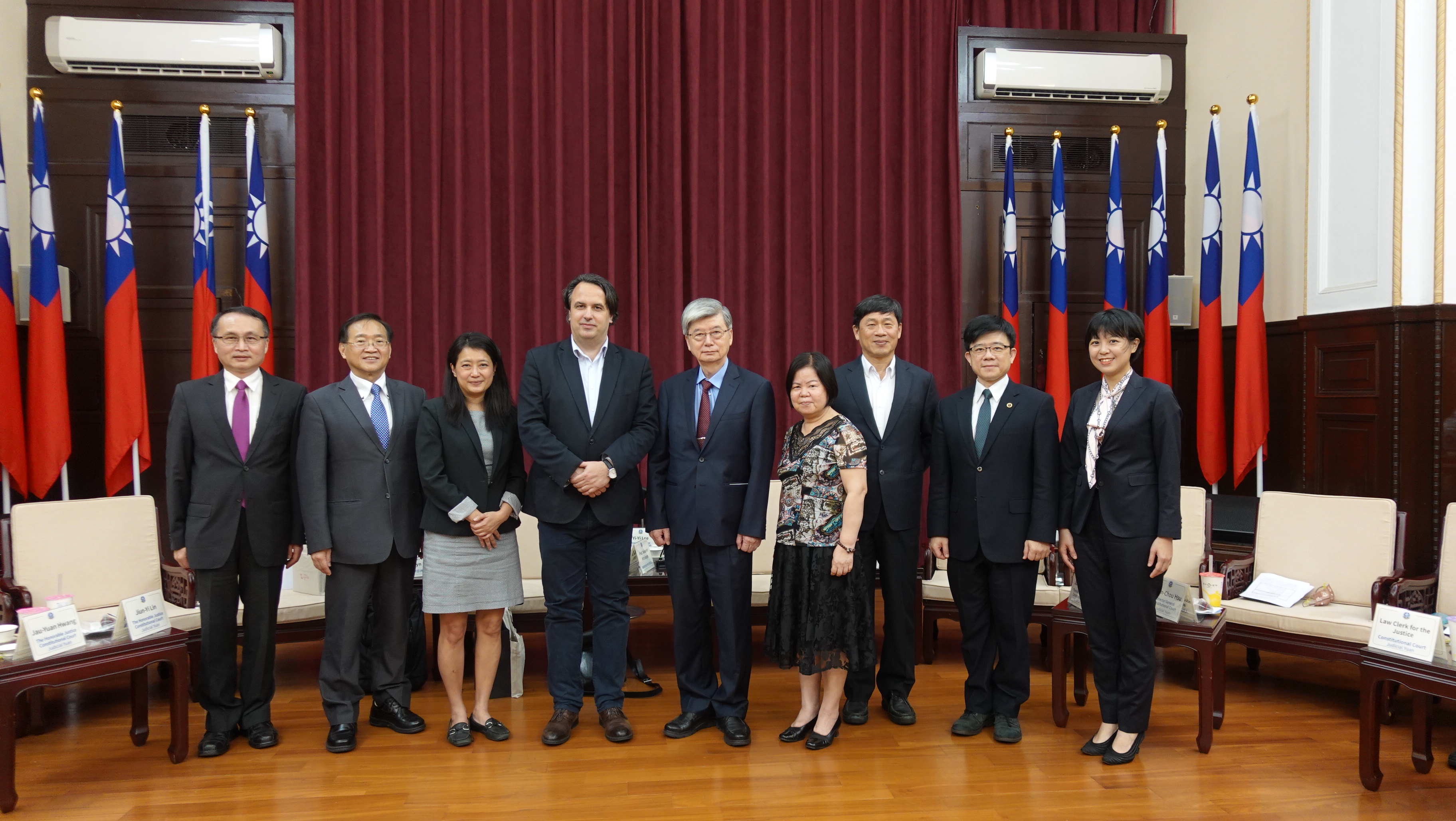Press Release
2023/06/28
The Taiwan Constitutional Court sincerely welcomes the visit of Dr. Valsamis Mitsilegas and Dr. Jaclyn L. Neo
 The visit of Dr. Valsamis Mitsilegas and Dr. Jaclyn L. Neo at the Judicial Yuan. (from left to right: Justice Jau-Yuan HWANG, Justice Jiun-Yi LIN, Dr. Jaclyn L. Neo, Dr. Valsamis Mitsilegas, Vice President Jeong-Duen TSAI, Justice Horng-Shya HUANG, Justice Jui-Ming HUANG, Director-General Chen-Chou HSU, Research Judge Yi-Yi-Lee.)
The visit of Dr. Valsamis Mitsilegas and Dr. Jaclyn L. Neo at the Judicial Yuan. (from left to right: Justice Jau-Yuan HWANG, Justice Jiun-Yi LIN, Dr. Jaclyn L. Neo, Dr. Valsamis Mitsilegas, Vice President Jeong-Duen TSAI, Justice Horng-Shya HUANG, Justice Jui-Ming HUANG, Director-General Chen-Chou HSU, Research Judge Yi-Yi-Lee.)
TAIPEI, June 28, 2023. On June 15, the Judicial Yuan and the Taiwan Constitutional Court (TCC) welcomed the visit of Dr. Valsamis Mitsilegas (Professor of European and Global Law and Dean of the School of Law and Social Justice at the University of Liverpool) and Dr. Jaclyn L. Neo (Associate Professor and Director of the Centre for Asian Legal Studies at the National Singapore University Faculty of Law). On behalf of the Judicial Yuan and the TCC, Vice President of the Judicial Yuan, Justice Jeong-Duen TSAI, expressed sincere welcome to Dr. Mitsilegas and Dr. Neo upon their meeting, which was accompanied by Justice Horng-Shya HUANG, Justice Jiun-Yi LIN, Justice Jui-Ming HUANG, Justice Jau-Yuan HWANG, Director-General of the TCC Mr. Chen-Chou HSU, Research Judge Yi-Yi LEE (translator of this meeting), and several law clerks.
Dr. Mitsilegas is a UK-based expert in European Criminal Law. His research interest rests in the protection of fundamental rights and the construction of the legal framework for judicial cooperation in the EU. He is regularly consulted by EU legislative bodies, and he has been active in constructing the legal framework of European criminal justice cooperation. Dr. Mitsilegas also visited the Judges Academy on June 16, where he delivered a speech under the title "Lessons from the EU—Efforts to Legislate on Cross-border E-evidence." Dr. Neo is a Singapore-based scholar in Asian Comparative Constitutional Studies. She has been long-cultivating in the research fields of Comparative Asian Constitutionalism and the diversity in interactions between different constitutional courts and their respective societies/cultures.
During their meeting, Dr. Mitsilegas drew on the example of the European Union and talked about the dynamics between regional integration and constitutional integration. He elaborated that, although European integration originated from a union in economies and trades, migration of people and circulation of capital alongside transnational economic activities has caused various complex problems in the past two decades. Therefore, the subject matters of regional integration in the EU has been incrementally expanded into areas such as migration, criminal justice, social security, and data protection. Under this development, the Court of Justice of the European Union inevitably has to engage in dialogues with constitutional courts of different nations and the European Court of Human Rights when interpreting the scope and content of fundamental rights. In this respect, the Court of Justice of the European Union has developed numerous case-laws to manage directly the issues concerning the constitutional protection of fundamental rights. Dr. Mitsilegas pointed out that the European Community, formed in the mid-twentieth century, has gradually developed into the European Union, which is founded upon the common values of the principles of democracy, fundamental rights, and the rule of law. Despite decades of integration base on common values, the Charter of Fundamental Rights of the European Union did not enter into force until 2009. In this sense, the experience of the European Union might set an example of regional integration and its constitutional integration effect.
During the meeting, Dr. Neo also introduced the highly debated core issue and vantage point of Asian constitutional studies, which is whether there can be a common "Asian Constitutionalism" among Asian countries. She pointed out that the possibility of the existence of a common Asian Constitutionalism doesn't necessarily have to do with cultural diversity, but rather depends on whether people of multiple cultures can have a common pictures on constitutionalism and perception towards their country and constitution. This issue is still under development. One current attempt in search of a common constitutionalism in the Asia region is the ASEAN Human Rights Declaration. Dr. Neo emphasized that this research field may inspire Asian countries to refer to their neighboring countries with similar politics, economy, and geopolitical/cultural context, in addition to countries such as the US and Germany, when searching for answers to contemporary issues of constitutionalism.
Vice President TSAI, Justices of the TCC, and assistant of the Justices attending the meeting also exchanged further views with the two scholars on topics such as common grounds in Asian and European cultural diversity, perspectives and contexts of foreign legal institutions, the possibility for Asia to establish (common) constitutional values like the EU, increasing judicial efficiency, and establishing public trust in the judiciary.